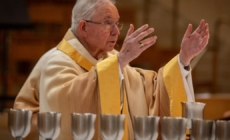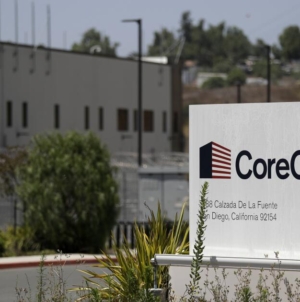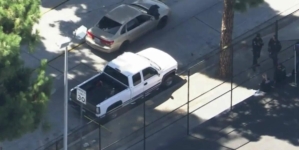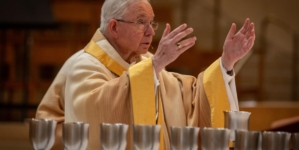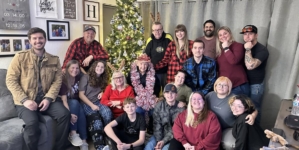-
A DACA recipient made a wrong turn at the border. Now he faces deportation - 4 mins ago
-
Mariners, Diamondbacks May Swing Another Trade After Josh Naylor Deal - 14 mins ago
-
Mariners Acquire First Baseman Josh Naylor From Diamondbacks for 2 pitchers - 21 mins ago
-
Shooter at large after man found dead inside car near Whittier school - 43 mins ago
-
Former Dodgers, Diamondbacks Gold Glove Shortstop Suddenly Retires After 15 Years - 54 mins ago
-
Kishi Núñez gets on the board for Argentina 1-0 over Ecuador - about 1 hour ago
-
Blinded Ukraine soldier returns home - about 1 hour ago
-
L.A. Catholic Church creates program to feed undocumented immigrants - about 1 hour ago
-
Dodgers Land $20 Million Emmanuel Clase In Emergency Hypothetical Trade - 2 hours ago
-
New Lyft feature lets riders select drivers they want to hire again as a favorite - 2 hours ago
Samuel Woodward convicted in stabbing death of gay high school classmate Blaze Bernstein
An Orange County jury convicted Samuel Woodward of first-degree murder Wednesday in the stabbing death of his gay high school classmate.
During the three-month trial, both sides portrayed the 26-year-old Woodward as a young man who struggled with his sexuality growing up in a conservative Newport Beach family, with a particularly disapproving father.
Deputy Dist. Atty. Jennifer Walker told the jury that when Woodward decided to kill Blaze Bernstein, his former classmate, in January 2018, he chose a weapon with symbolic significance: a knife with his father’s name etched on it.
“Who better to prove to that you’re not gay than this homophobic father?” Walker said during closing arguments. “‘I’m not gay, look what I just did.’”
Jurors began deliberating Woodward’s fate Tuesday afternoon and came back with their verdict a day later. They also convicted Woodward of a hate-crime enhancement, which applied to only to Bernstein’s sexual orientation, though he was both Jewish and gay.
Woodward faces life without the possibility of parole, with a sentencing hearing scheduled for Oct. 25.
Woodward’s attorney, Assistant Public Defender Ken Morrison, acknowledged that his client was guilty of stabbing Bernstein 28 times in a Lake Forest park, which he called a “hideous crime,” but said it was voluntary manslaughter, not murder.
“There’s no premeditation or deliberation,” he told jurors, arguing that Bernstein had provoked Woodward. He said the killing had no connection to his client’s interest in the Atomwaffen Division, an extremist group whose anti-gay, anti-Jewish propaganda was found on Woodward’s computer.
On the night of the killing, Bernstein and Woodward exchanged flirtatious text messages. They had known each other casually years earlier at the Orange County School of the Arts, where Woodward had a reputation based on his far-right, anti-gay views.
Woodward, who kept a “hate diary” in which he bragged of pranking and frightening gay men, had dropped out of college and was living with his parents. Bernstein, an out gay student at the University of Pennsylvania, was staying with his parents over winter break in Lake Forest.
Woodward suggested he was bi-curious. Bernstein texted his address. Woodward picked him up, and they went to a nearby park.
“Unfortunately for Blaze, curiosity killed him,” Walker said.
Taking the stand in his own defense, Woodward seemed nearly catatonic, his words halting and slow, his eyes cast downward, his face covered by a curtain of unkempt hair. His attorney had to keep reminding him to look up.
Woodward testified that he took two puffs on a strong marijuana joint, went into a haze and came out of it to find Bernstein touching his genitals.
By Woodward’s account, Bernstein told him he had been outed, called him a hypocrite and said something like, “I got you.” Woodward said he feared that Bernstein had taken a photo of his genitals and was texting it to someone.
Asked for details about the stabbing, Woodward repeatedly said he couldn’t remember.
Bernstein’s blood was found on the knife bearing Woodward’s father’s name, leading prosecutors to conclude it was the murder weapon. But Woodward insisted he had used a different knife.
No evidence surfaced that Bernstein took explicit photos of Woodward, and Walker, the prosecutor, called the defendant’s account “ridiculous” and “revisionist history.”
Deriding the notion that Woodward flew into a rage for fear of being outed, she said he had posted his own photo on a Tinder profile saying he was seeking other men and had sent out photos of his penis more than once.
She said that “taking a weapon with your dad’s name is very symbolic,” particularly since Woodward, an Eagle Scout, had multiple knives. The prosecutor said that by killing Bernstein, Woodward was hoping to raise his profile with the Atomwaffen Division.
“It will prove to Atomwaffen he’s not gay,” Walker said. “It will prove to his dad he’s not gay. It will prove to himself he’s not gay.”
When police searched Woodward’s belongings, they found a death’s-head mask — an emblem of the Atomwaffen — spattered with Bernstein’s blood, indicating Woodward had it with him during the stabbing.
“Why are you bringing a skull mask?” Walker said. “This is a ceremonial killing for him that is going to get him prestige and admiration, which it did. We heard Atomwaffen was proud of him for this.”
Woodward buried Bernstein in a shallow grave in the park, and, to divert investigators, sent texts to Bernstein’s phone asking where he was. Woodward’s initial account to police was that he had accompanied Bernstein to the park but that Bernstein had inexplicably wandered off.
After a weeklong search, Bernstein’s body was found when the rain washed away dirt concealing his body. No shovel was found. Dirt was discovered under Woodward’s fingernails, however, and Morrison said he had dug the makeshift grave with his hands, an argument that it was not a premeditated crime.
Morrison portrayed his client as a socially awkward young man who suffered for years with undiagnosed autism.
He said there was no evidence that Woodward had actually pranked and terrorized gay men beyond the account in his “hate diary,” which Morrison characterized as empty boasting.
Morrison denied that Bernstein’s fatal stabbing was “a hate-fueled crime inspired by the likes of Hitler and [Charles] Manson.”
He attributed his client’s attachment to the Atomwaffen Division to “his lifelong struggle to fit in, to make and maintain meaningful friendships,” which left him vulnerable to a group that offered fellowship and preyed on people like him. He said his client had a “starvation for human connection.”
Source link







